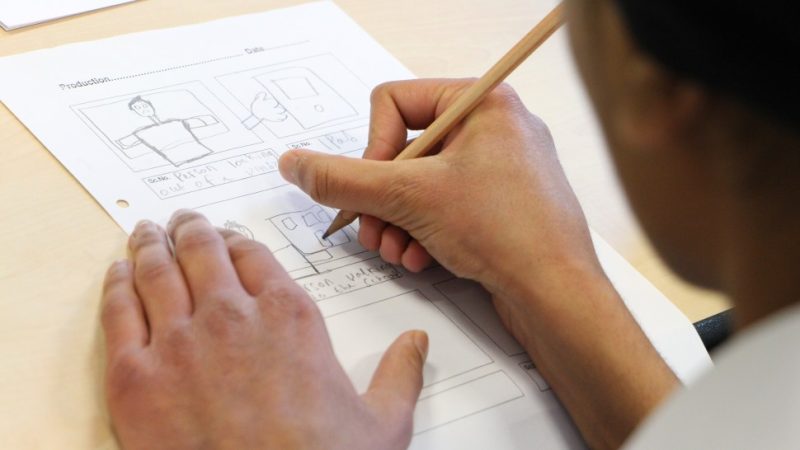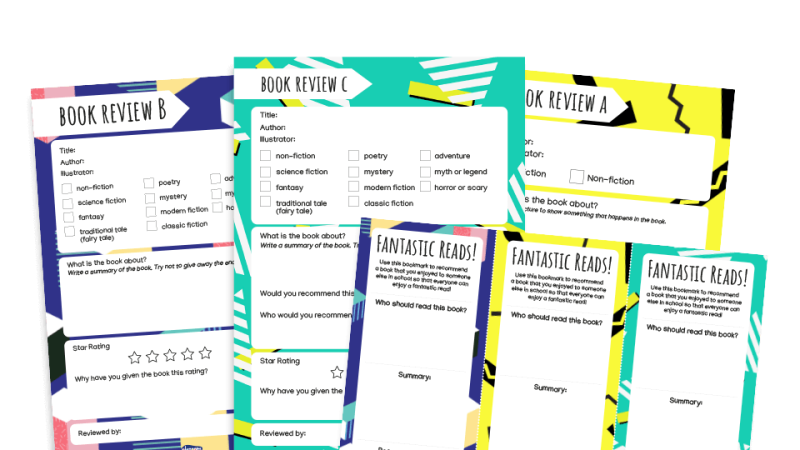Punctuation games – Ideas, resources & online games for KS1/KS2
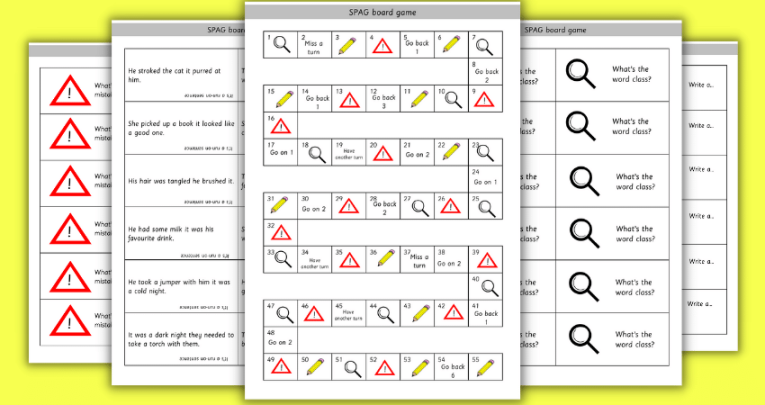
Stop! Punctuation time. Give these offline and online games a go and sharpen up students' skills with that pesky punctuation placement…
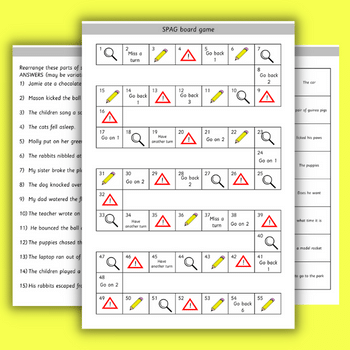
Jump to a section
- Punctuation games for KS1
- Punctuation games for KS2
- KS2 punctuation worksheets
- Online punctuation games
There’s a risk that teaching punctuation can be quite dry, but it doesn’t need to be! There’s a wealth of high-quality online punctuation games that children can use to practise basic sentence skills.
Another option is paper-based or verbal games that you can use in lessons or in a spare five minutes in your school day.
The main writing barrier I’ve found with the classes I’ve taught is a lack of a clear understanding about what constitutes a sentence.
The purpose of the following games and activities is to help children understand the key parts of a sentence (the subject and the predicate). Then they’ll learn how to combine or extend the sentences that they write.
For the majority of the below activities you simply need a whiteboard or screen to display sentences on. Scrap paper, mini whiteboards or notebooks for children to work on are also useful.
Punctuation games for KS1
Punctuation paddles
For this KS1 punctuation game, each child will need three pieces of paper with either an exclamation mark, question mark or full stop drawn on it.
Display a statement, command, question or exclamation without the end punctuation. Ask children to hold up their paper ‘paddle’ with the correct punctuation mark.
You can also play this game using Plickers. Here, children hold up a code similar to a QR code and orient it to a certain position to answer multiple-choice questions. You then scan the cards using an iPad or other device to record students’ answers.
Spot the mistake
If there’s one thing that children enjoy, it’s correcting their teacher when they make a mistake.
This game doesn’t need any preparation except for having sentences pre-written or ready to display on the board.
The most successful way I’ve done this is to choose a range of common misconceptions that have featured in pupils’ writing. I also recap basic sentence structure – such as missing a subject in a sentence.
As a way of scaffolding this, you may want to provide the number of mistakes to look out for, or what type of mistakes. For example:
We cant wayt for tea. (one missing punctuation and one spelling)
Silly sentences
With all SPAG games, having a chance to be silly and creative is important. (This is as long as sentences created are grammatically correct!).
When introducing children to a grammatical technique, provide a chance for children to experiment and to have fun with their learning.
For example, when children are learning about the structure of a semi-colon with ‘however’, you might explore sentences that show how it works. For example:
I bought a new car; however, it broke down straight away.
Children can then take the same structure and be creative by changing one part:
I bought a new car; however, the seats were filled with spiders.
Coming up with sensible sentences related to current learning may sometimes be difficult when learning about a new grammatical skill. However, being able to come up with ridiculous sentences allows pupils to explore more extreme examples without fear of the content having to be accurate.
Children with strong interests in a certain topic (Nissan GTRs, Ronaldo or narwhals are some examples that spring to mind from my own classroom!) enjoy having this opportunity to include those passions in their SPAG work.
Sentence matching
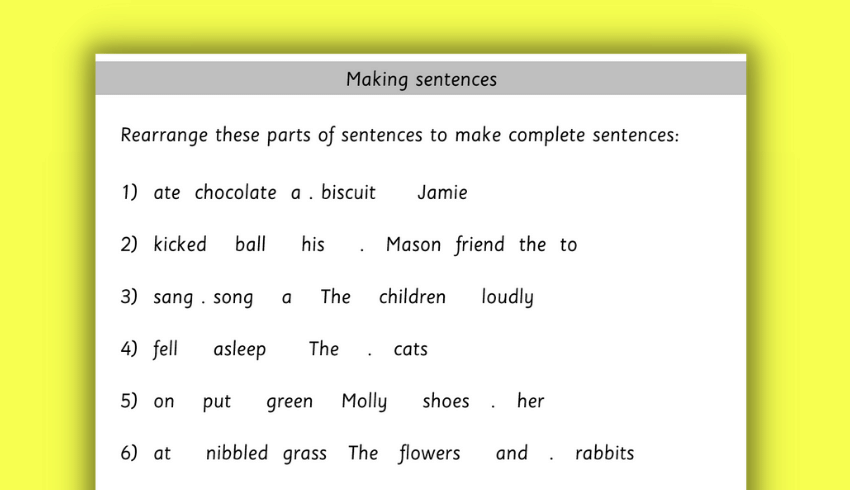
This is another game which can be played in several different ways. At word level, you can jumble up the words in a sentence for children to unscramble. Download our example sentences here.
To support this, start by keeping a capital letter on the word that should be at the start of the sentence. You can then remove this scaffold later on.
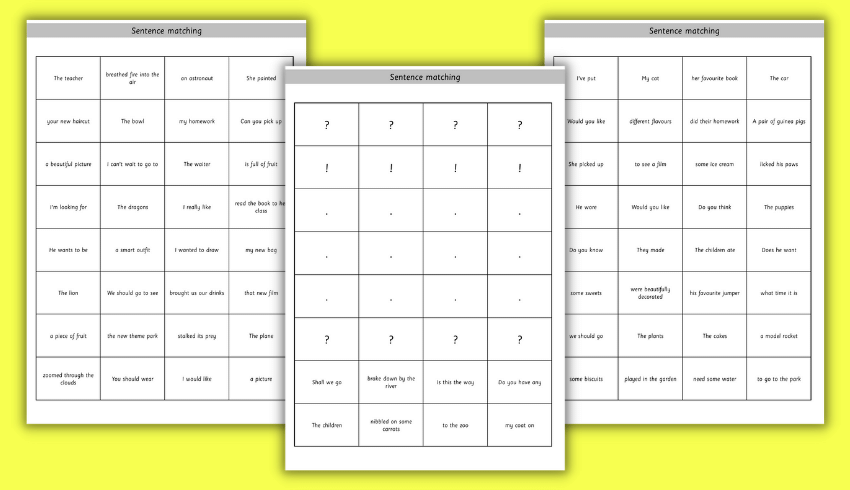
Extend this activity by providing a set of sentences that you’ve split up into parts (ideally separating the subject and the predicate, eg The children ate / the delicious cakes). Download cards for this game here.
Ask the children to mix up the cards until they create sentences that make sense. Alternatively, turn over a card from a deck. Take it in turns to lay cards until a sentence is created.
For an added challenge, include a mixture of statements and questions, along with the relevant punctuation.
Memory game
We’ve probably all played this game before – present a tray with a range of objects on it, then cover it up. Players then have to recall what objects they saw.
In this version, display two or three short sentences on the board (adapt these depending on age and confidence). These should feature your target punctuation. This may be simply capital letters and full stops or more advanced skills.
After a few moments remove the sentences and ask children, either in pairs or individually, to recall and write down as much as they can remember.
Just like in the original tray game, children will have to pay careful attention to recall as much as possible. This encourages them to focus on punctuation.
Punctuation games for KS2
Pick-up sticks
Write a selection of different nouns on lolly sticks and put them in a pot, then add a selection of different adjectives in a different pot, followed by grammatical skills (relative clause, apostrophe for contraction, etc) in a third.
Children take it in turns to pick out a selection of sticks from different pots, then have the challenge of writing a sentence containing, for example:
- rowing boat
- chicken
- angry
- a relative clause
At the start it’s best to play this game in groups or without the grammatical terms, to allow children to explore the creativity of using the given words.
Change a word
This game can work in several different ways, and the aim is to get children to play around with word class and sentence structure.
One way to play involves all children having a piece of paper and writing a simple sentence at the top. For example:
The cat climbed the tree.
Now pass the paper onto the next person, with the sentence still visible at the top. The child who receives it changes one word in the sentence and writes it below the first one:
The boy climbed the tree.
Now fold back the top of the paper with the first sentence so only the second sentence is visible, and pass the paper on to the next child.
Repeat the process, changing one word in the currently visible sentence:
The boy climbed the mountain.
After a few turns, extend this activity by asking children to add an adverbial phrase or another grammatical skill.
The purpose of this game is to help children to see the parts that make up the sentence and how they can be exchanged for another group of words that work in the same way.
Improving sentences
This game is best used to help children to edit writing. Display a set of different things that children can add or change about a sentence. For example, ‘change the subject’, or add:
- an adjective
- a subordinating conjunction
- a relative clause
It’s best if these are things that you’ve recently covered in class to ensure that children know how to apply the skills.
Accompany each item on the list with a number and provide children (either individually or in pairs) with a dice. With either pre-prepared simple sentences or with their own, children roll the dice and follow the instruction of the number rolled.
After a few alterations, change the sentence for a different one and continue.
SPaG board game
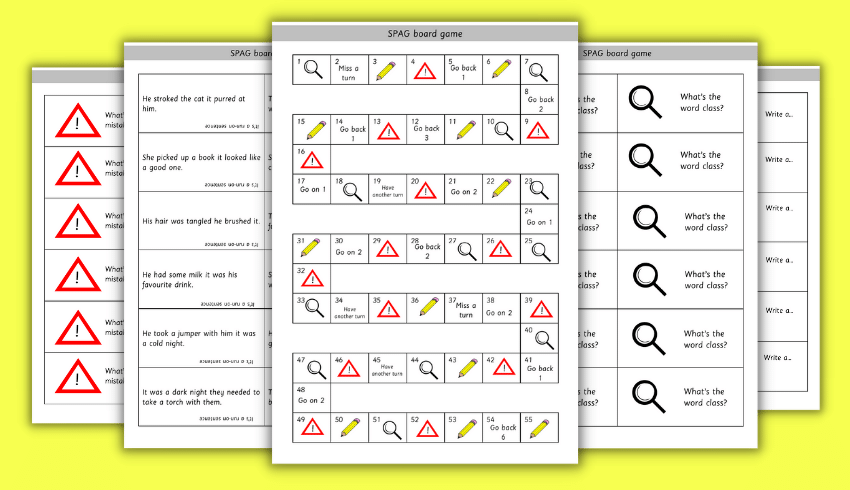
This downloadable SPaG board game aims to build on children’s skills to identify mistakes in sentence, write their own statements, commands and question and identify word class.
Just like in Monopoly, there are different symbols that relate to piles of cards that children pick up and complete.
You can easily adapt these for different year groups to reflect the areas you want to target. This game requires a little more preparation, but you can easily add to it over time once you’ve made it.
Missing commas KS2 game
When children discover commas, they often start sprinkling them like confetti through their writing without a secure understanding of where they are needed, which often leads to comma splices (where they try to use a comma to separate two sentences).
To get children used to identifying where commas are needed, provide them with sentences with all commas removed and ask them to add in the missing commas. Provide support by telling children how many commas are needed or what the comma purpose is. For example:
In the morning the children packed sandwiches crisps and drinks and went to the beach.
In the morning the children packed sandwiches crisps and drinks and went to the beach. (Two commas)
In the morning the children packed sandwiches crisps and drinks and went to the beach. (fronted adverbial and comma in a list)
A good game for practising commas in a list is a version of ‘I went to the shop and I bought…’. Provide children with strips of paper to write a strange object on, then (either as a class or in small groups) form silly lists.
Write the introduction part of the sentence (‘I went to the shop and I bought’) on a separate strip, and also have separate strips featuring commas and ‘and’.
This should reinforce that either a comma or ‘and’ is needed between items on a list.
Similar to the silly sentences mentioned earlier, a good activity to practise commas for relative clauses is to display simple sentences which children have to add a silly (but still relevant!) relative clause to.
The monster yawned.
The monster, _______________, yawned.
The monster, who________________, yawned.
Fortunately, unfortunately
I remember playing this game on school trips when I was in primary school, and really enjoying it.
Take it in turns to say a sentence, alternating at the start with ‘fortunately’ or ‘unfortunately’. For example:
The cat woke up and looked out of the window.
Fortunately, it was a beautifully sunny day.
Unfortunately, he could see his arch enemy sitting on the fence.
Extend this by co-creating a fronted adverbial bank including a range of different adverbials such as ‘At that moment’, ‘Almost unbelievably’ or ‘To his delight’.
Ask each child to select a different adverbial from the bank to start their sentence with. To help embed the use of commas after fronted adverbials, model reading the sentences with correct emphasis.
KS2 punctuation worksheets
Our free punctuation games download contains a guide on how to identify the subject and the predicate in a sentence, along with how to find and correct comma splices, fragments and run-on sentences.
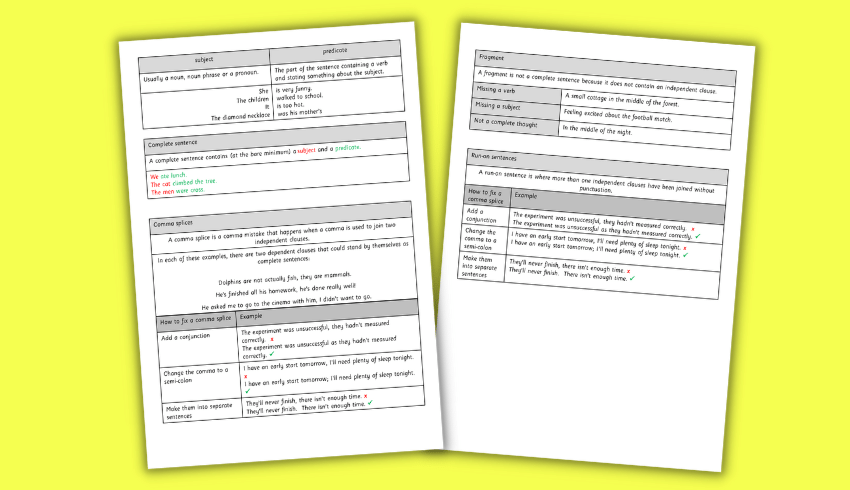
Use the included subject and predicate worksheet and the worksheets about complete sentences, fragments, comma splices and run-on sentences to help pupils get to grips with this vital punctuation learning.
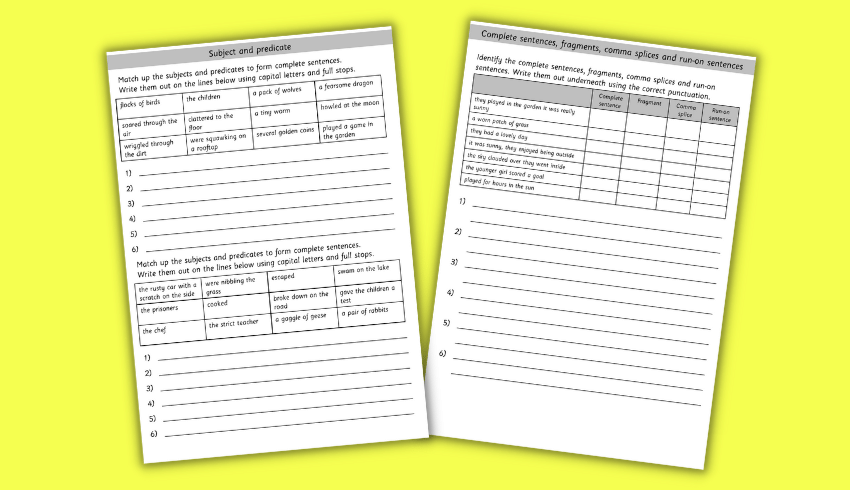
Sarah Farrell is a KS2 teacher in Bristol who makes and shares resources online. Follow Sarah on Twitter @SarahFarrellKS2 and see more of her work at mrsfclassroom.wordpress.com
Online punctuation games
BBC Bitesize Small Town Superheroes
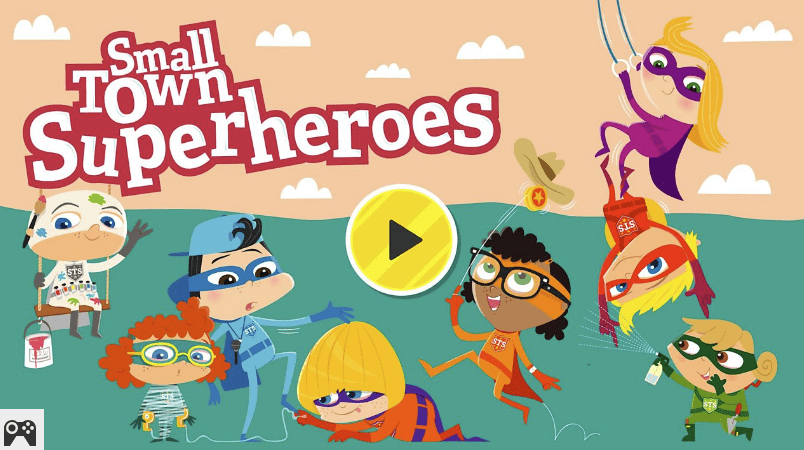
Build and test the English skills of KS1 pupils with this fun Small Town Superheroes game from BBC Bitesize. Children will need to perfect their punctuation with MC Ernie – as well as playing 17 other mini games all themed around SPaG.
Punctuation gameshow
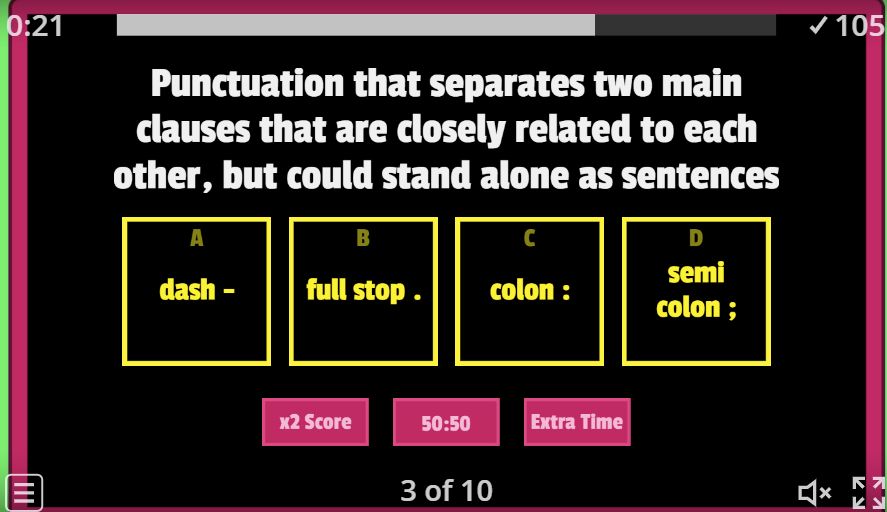
This multiple choice grammar quiz has a countdown to add drama, plus lifelines and a bonus round.
Punctuation speed check
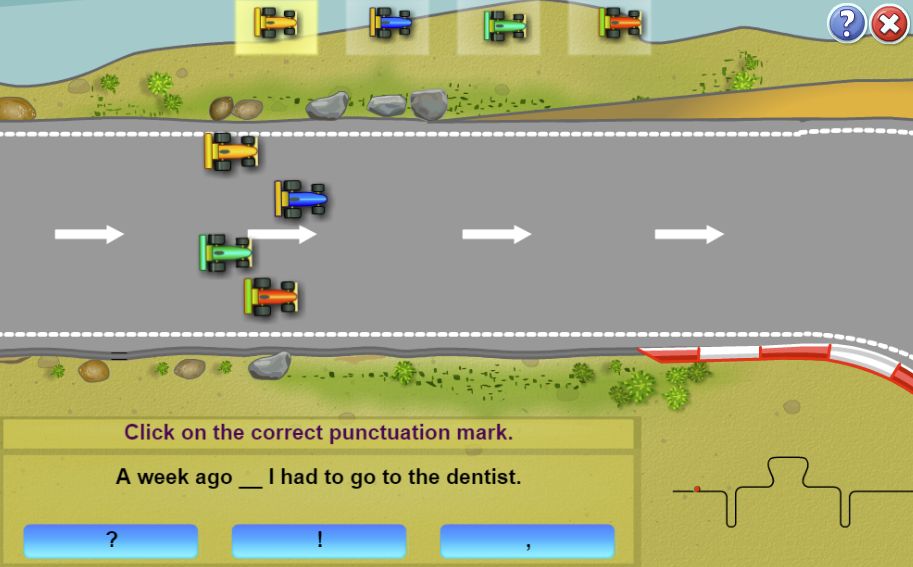
Test and build pupils’ knowledge of punctuation marks with this speedy racecar game. Children need to identify the missing punctuation mark in the sentence at the bottom of the screen and click on it to win the race.
Snail full stops
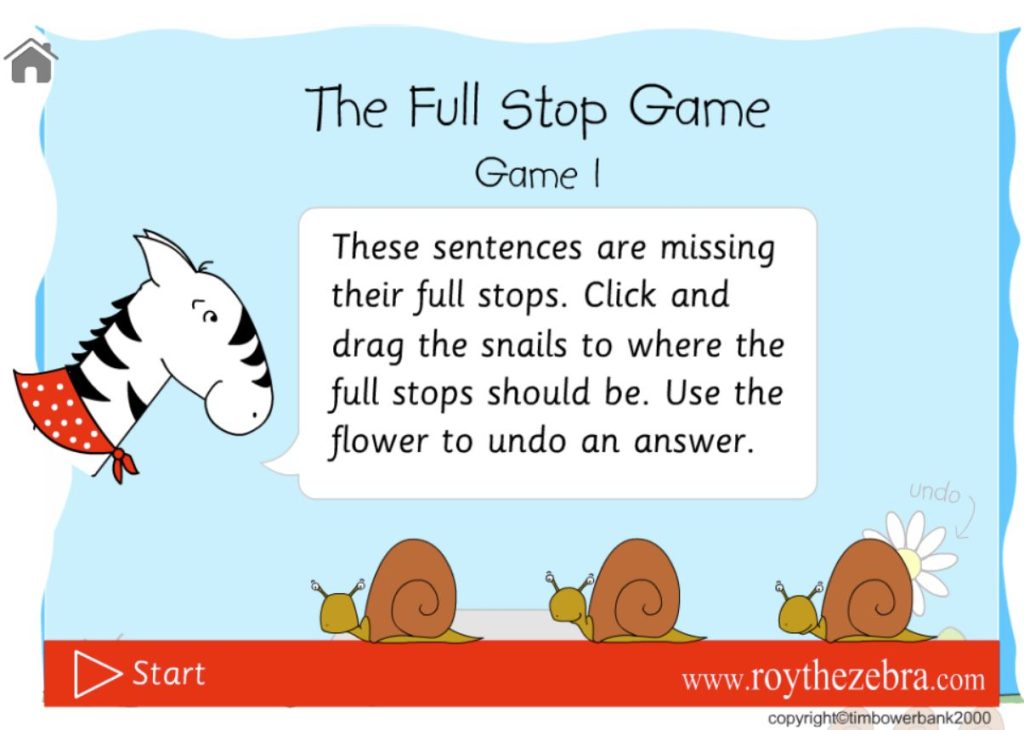
Oh dear! These sentences have lost their full stops. Pupils need to drag the cute snails to put the full stops in their correct places.
Sentence doctor
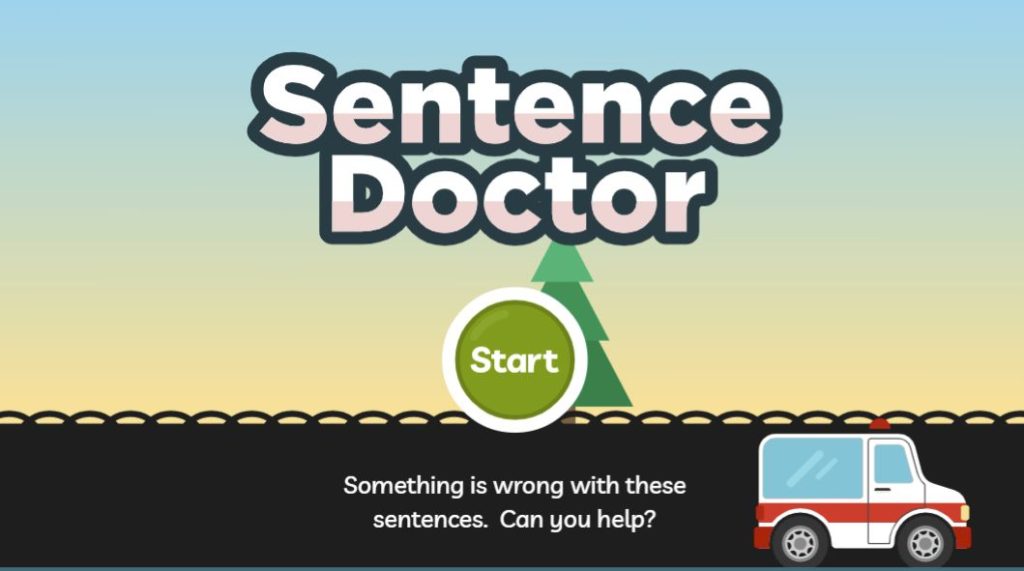
In this game pupils need to fix poorly sentences by discussing a diagnosis with a partner. You can focus on problem punctuation, confusing commas or awkward apostrophes, and there are three difficulty levels.
Punctuation balloon pop
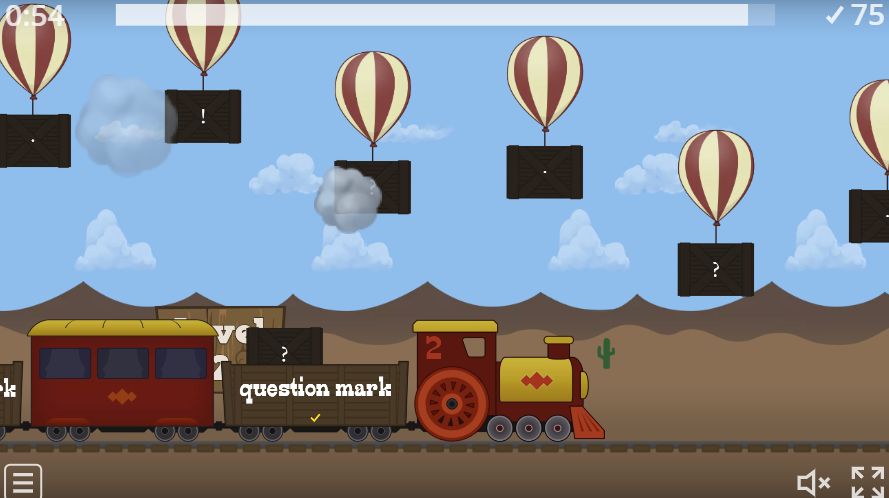
This game is super simple to get to grips with. All you have to do is pop the balloons to drop each punctuation mark onto its matching definition.
Punctuation mystery
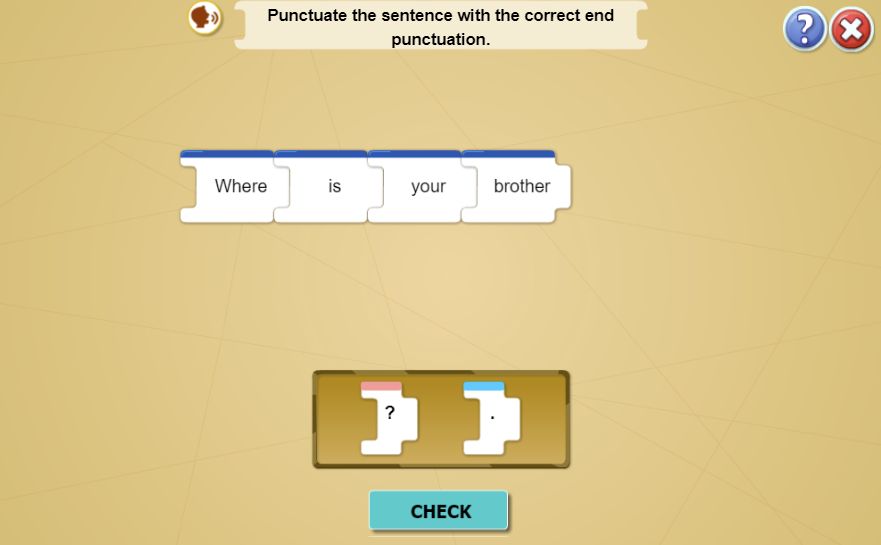
In this game you’ll see words arranged side by side to form a sentence. All you need to do is choose the correct punctuation mark to complete the sentence, before checking your answer.
Browse more SPaG games.









